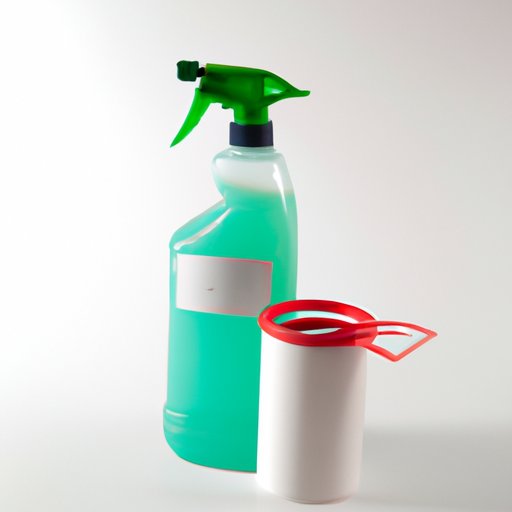
Can You Mix Hydrogen Peroxide and Vinegar? Understanding the Risks and Alternatives
Mixing hydrogen peroxide and vinegar is a common cleaning hack that has been gaining popularity in recent years. While both substances have numerous benefits, combining them can be dangerous and even deadly. In this article, we will explore the do’s and don’ts of mixing hydrogen peroxide and vinegar, the science behind the reaction, the potential dangers, and alternatives to this cleaning hack.
The Do’s and Don’ts of Mixing Hydrogen Peroxide and Vinegar: A Comprehensive Guide
Hydrogen peroxide and vinegar can be incredibly useful for cleaning and disinfecting due to their antibacterial and antiviral properties. However, it’s essential to use them safely and correctly.
The most crucial thing to keep in mind is never to mix hydrogen peroxide and vinegar in the same container. The two chemicals can create a dangerous chemical reaction, producing peracetic acid. Peracetic acid can cause severe respiratory and skin irritation and can be deadly if ingested.
If you need to use both substances simultaneously, use them separately and rinse the surface thoroughly before applying the other. Alternatively, use one cleaning agent and then the other, but never combine them.
When using hydrogen peroxide, always dilute it, and never use it at full strength. Not only can full-strength hydrogen peroxide be dangerous, but it can also damage surfaces, leaving stains or marks.
When using vinegar, make sure that it’s not mixed with baking soda, ammonia, or any other cleaning agent. Mixing vinegar with baking soda, for example, creates a chemical reaction that produces carbon dioxide and leaves a residue that can be challenging to remove.
What Happens When You Mix Hydrogen Peroxide and Vinegar: Exploring the Science behind the Reaction
When hydrogen peroxide and vinegar are mixed, peracetic acid is produced. Peracetic acid is corrosive and can cause severe respiratory irritation when inhaled. It can also lead to severe dermatitis and skin burns if it comes into contact with the skin.
The reaction between hydrogen peroxide and vinegar is an oxidation-reduction reaction. This reaction occurs when electrons transfer from one molecule to another. The hydrogen peroxide molecule oxidizes, losing electrons, and the vinegar molecule reduces, gaining electrons.
The overall reaction can be written as:
CH3COOH + H2O2 -> CH3COOOH + H2O
Cleaning Hacks Gone Wrong: Why Mixing Hydrogen Peroxide and Vinegar Can Be Dangerous
Despite the apparent benefits of mixing hydrogen peroxide and vinegar, this cleaning hack can be dangerous and even deadly. Several cleaning hacks have gone wrong due to the combination of these two substances.
One woman, for example, mixed hydrogen peroxide and vinegar in a spray bottle to clean her bathroom. The mixture caused an explosion in the bottle, releasing peracetic acid, which resulted in severe respiratory distress.
Another person mixed hydrogen peroxide and vinegar to clean their hardwood floor, but the combination destroyed the floor’s finish, leaving permanent stains.
The possible risks when mixing hydrogen peroxide and vinegar include respiratory issues, skin burns, eye irritation, and even death.
Alternatives to Mixing Hydrogen Peroxide and Vinegar: Effective Cleaning Solutions for Your Home
Fortunately, there are alternatives to mixing hydrogen peroxide and vinegar for your cleaning needs.
Baking soda, for example, is an excellent alternative to vinegar, which can be used for cleaning and removing tough stains. Baking soda is a mild abrasive that can remove stubborn dirt and grime, making it perfect for cleaning surfaces such as ovens, bathtubs, and sinks.
Lemon juice is another effective alternative to vinegar, which can be used for cleaning and disinfecting because of its antibacterial properties.
Hydrogen peroxide can also be used as a standalone cleaning agent when diluted, and disinfectant wipes can be used instead of vinegar for disinfecting surfaces.
Debunking the Myths: Separating Fact from Fiction About Mixing Hydrogen Peroxide and Vinegar
It’s essential to debunk some common myths and misconceptions surrounding mixing hydrogen peroxide and vinegar.
For example, some people believe that mixing hydrogen peroxide and vinegar produces a more effective cleaning agent. However, this is not true. Mixing hydrogen peroxide and vinegar produces a dangerous and deadly chemical reaction, not a more potent cleaning agent.
Another misconception is that hydrogen peroxide and vinegar can be used to disinfect fruits and vegetables. However, doing so can be hazardous. Instead, use a food-safe wash or plain water to clean fruits and veggies.
The Chemical Composition of Hydrogen Peroxide and Vinegar: Understanding the Risks of Combining Two Powerful Cleaning Agents
Hydrogen peroxide is a chemical compound containing two hydrogen and two oxygen atoms. It’s a reactive compound and can be dangerous if used at full strength.
Vinegar, on the other hand, is a weak acid, usually containing 5-8% acetic acid. Because of its acidity, vinegar can dissolve mineral deposits, dirt, and grime. However, it can be harmful if mixed with other cleaning agents.
The combination of hydrogen peroxide and vinegar is dangerous because they produce peracetic acid, a harmful and deadly chemical. Peracetic acid can cause severe respiratory and skin irritation, and its fumes are hazardous to inhale.
Conclusion
In conclusion, mixing hydrogen peroxide and vinegar can be dangerous and even deadly. It’s essential to use these substances safely and correctly. Alternatives to this cleaning hack are readily available, and many are equally effective without the associated risks.
Remember, always dilute hydrogen peroxide, never mix it with vinegar or other cleaning agents, and rinse surfaces thoroughly before applying the other. With this knowledge, you can effectively and safely clean and disinfect your home.




